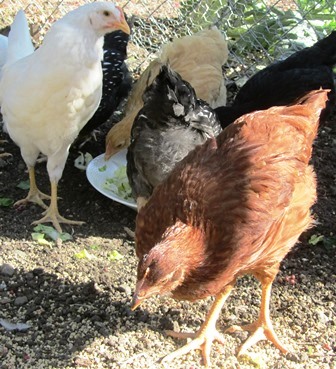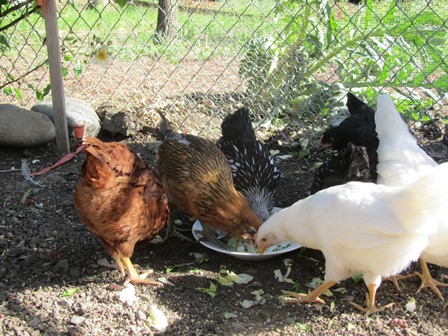Consider This Before You Get Backyard Chickens
My bedroom window faces the back of our property where the chicken coop sits. Every morning, I’m awakened by repeated grauwkkkk sounds made by the Silver Laced Wyandottes and the Rhode Island Red hens, the noisiest ones of all my chickens.
I wish I’d read up more on the breeds before making my selections at the feed store. I love keeping chickens and the eggs are fabulous. That said, there are some of the areas I wish I’d known more about. I might have chosen different breeds.

Rhode Island Red hen seems to be at the top of the pecking order in this small flock of backyard chickens
1. Noisemakers–some breeds are noisier than others. I seldom hear the occasional cluck from my White Leghorns, but the Wyandottes never seem to shut up. Get a bunch of hens together and conversing, and you’ll soon see what I mean.
2. Snacking–chickens love snacks but give them judiciously. If they consume too many treats like blueberries, fresh corn from the cob, and bits of bread or rice, the quality of their eggs may suffer. But as soon as you give them treats, they become your best friends and will follow you around.
3. Pecking–chickens quickly establish a pecking order; they will also peck you . . . some harder and more aggressively than others. My Black Sex Link hen just seems kind of mean and pecks with impatience. But the Rhode Island Red will give an almost loving peck that’s not hard and doesn’t hurt.
4. Broodiness–when a hen goes broody (like my Wyandotte and Buff Orpington hens), her hormones have told her she needs to sit on a clutch of eggs until they hatch (about three weeks). But if you do not have a rooster to have fertilized those eggs, the hen will sit on them anyway, tying up a nesting box and hoarding eggs that will have to be tossed out when she finally figures out that she’s engaged in a futile pursuit of baby chicks. Some breeds tend to broodiness more than others.
5. Water and Food–chickens need water, love crumble, and can benefit from a serving of cracked grains and dried worms. To ensure their egg shells are sufficiently rigid, they may also need additional oyster shell calcium. And like all living beings they need fresh water. If they go without water, they can stop laying for weeks. I’ve figured out the cracked grains must be so tasty they are like cotton candy and after them, the hens don’t want their good food.
6. Diminishing Returns–hens begin laying when they are about five months old. After the first year, egg production will fall off about 20 percent in subsequent years. They generally lay eggs for seven or eight years, but can live to be older and produce no eggs.
7. Egg size–when a hen tries to lay too large of an egg, it can cause a condition called cloaca prolapse. It can claim her life–I’ve lost two chickens to this problem. One was an Ameraucana heritage chicken that laid blue-green eggs. I do miss her as she was skittish but quiet.
8. Moving Hens or a Rooster–if you are getting the gift of a chicken from a neighbor or friend, move that chicken into the flock at night. When he or she wakes up in the morning, the whole event will be a fait accompli and will generate less stress for all involved.
Working the Beds after the Weekend Storm

A “Pineapple Express” rainstorm with gale-force winds blew out the power and made for slick roads as well as ponds in our clay soil
The weekend storm is still a vivid memory, what with the fence along one side of my property beaten down by high winds and pounding rain that also brought a power outage on Friday night.
But today with outside temperatures in the 70s Fahrenheit, I cleaned my strawberry beds. Somehow, mint had crept in and I don’t want mint with my berries although I like it served that way for dessert.
My neighbor’s relative, who’s visiting from Lebanon where they grow apples in his mountain village, share a suggestion for digging dried chicken manure around the bases of my trees. The high nitrogen will get them off to a great start and my trees have already broken bud (which is attracting the honeybees).
The wild bird population seems to have exploded and I see signs of nest building starting. The five suet cakes I hung in trees for the songbirds, blue jays, and woodpeckers last month are down to a fraction of their original size.
I extended the chicken run with poultry wire high enough to keep the my heritage girls from flying out. Now, they’ll have plenty of space on both sides of the chicken house to forage and out the beds I’m working.
 Facebook
Facebook Goodreads
Goodreads LinkedIn
LinkedIn Meera Lester
Meera Lester Twitter
Twitter




